- Home
- Donald Hamilton
The Vanishers Page 11
The Vanishers Read online
Page 11
I decided that, although it would send the safety-minded folks back home into screaming fits, it was really a nice, sensible, cooperative way of utilizing a two-lane road to the fullest. I waved my thanks to everybody, as seemed to be expected of me, and settled down to some interesting driving. Beside me, Astrid had reclined her seat fully and fallen asleep. The pavement remained clear and mostly dry, although there was still snow in the fields we passed. They were less precipitous than those of Norway, but they’d never make you think nostalgically of the endless cornfields of Kansas. More like New England. There were numerous lakes with ice on them.
We stopped for an early lunch in Karlstad, on the largest lake in Sweden, called Vanem, an inland sea by local standards, also icebound. The snack bar served a delicious, spicy sausage that would make a bland Yankee hot dog crawl into a corner and hide its head in shame; and there was a little marzipan cake for dessert that far outclassed the soggy bakery goods served in U.S. roadside eateries. Obviously we’d arrived in a backward land that had not yet mastered the modern culinary art of rendering all food tasteless. Afterwards, I took evasive action northwards, just in case Bennett, or whoever was running the local operation for him, decided to gamble on assigning a man or two to watching this main highway east in the hope that, having disabled the pursuit temporarily, we’d be overconfident enough to stay with the easy route clear across the country.
The day remained gray and misty. We ran through a single snow flurry that lasted just long enough to powder the pavement lightly without slowing us down. Dodging from one winding little road to another, we got quite a distance northeast, and then angled back to the southeast. We reached the picturesque university town of Uppsala late in the afternoon, still with no company trailing along behind. I checked this out with a brief scenic tour—well, detour—through the city. There was a massive old brick castle on a hill and a fine cathedral. There was no shadow in the mirror. Beyond Uppsala, we picked up the four-lane highway that, if you wanted to go there, would take you to Stockholm some seventy kilometers away. Forty-three miles to you.
We didn’t want to go there; but I almost missed our exit. I’d been told what to look for, but Uppsala had spread southward since my last visit, so the distance was shorter than I remembered it. The sign appeared before I expected it: Krokvik, translating to Crooked Bay. It seemed an odd name for a community well inland. Actually it was a reminder that geography is not a constant in those parts. The land is rising steadily out of the sea. Nowadays the Baltic coast is many miles to the east, but within historical times it had been much closer, and the small stream we soon crossed, running between high banks, had been a river inlet large enough to be used by the Viking longships. But I found it a bit claustrophobic to be in a country I could drive across in a day, after coming from one where it had taken me the best part of a week to traverse barely half of it.
Astrid stirred beside me, opened her eyes, and jacked up the back of her seat so she could sit up and look around.
“Where are we now? What was that stream we just crossed?”
“It’s called Ulvan, however you pronounce it.”
“Ulvan, please. Uhlv-own. Meaning the Wolf River. Ulv, wolf, also called varg. An, the river.”
“Yes, ma’am,” I said.
She laughed. “I apologize. I just woke up. I did not mean to sound like a schoolteacher… Then we must be near Uppsala.”
“Correct. We left it about ten kilometers back up the valley while you were still asleep. And here we go, if that’s the right turn ahead. The right left turn. It’s a long time since I was here.”
“Do you find many changes, Matt?”
I shrugged. “There weren’t any four-lane highways back then, to amount to anything, and Uppsala has grown a lot, of course. But things don’t look very different out here among the fields and farms.”
“How far is it now?”
I’d made the turn, and we were on a very narrow unpaved farm road that was muddy in spots. However, drainage ditches on both sides carried away the water from the melting snow, so the track remained reasonably firm. A wide place was marked by a blue sign sporting a white M to indicate a meeting place—Mötesplats to you—where you could turn out to let opposing traffic go by, or vice versa. I waved my hand at the snowy field to the right.
“Look way over there in the trees. The place is called Torsäter. You can see the smaller white villa below the main house. Old Baron Stjernhjelm was living in the big house when I visited him, at the time of the yearly äig hunt—as you probably know, it’s a moose, not an elk as the sound of the name might make you think. But I understand that when his son got married, the old man moved into the guesthouse and let the young couple take over the mansion, if you want to call it that. It’s not enormous, but it’s a very handsome old place. I gathered over the phone that the old man has had to move to a sanitarium, and the little villa has reverted to its original function of a guesthouse. There’s nobody in it at the moment, so we’re welcome to it.”
Astrid glanced at me sharply. “Stjernhjelm?”
“I told you my dad chopped it down to something Yankees could pronounce, when he got to America.”
“And Swedish titles go to all the children, not just the oldest son; so you’re a baron, really?” She sounded impressed.
“Not really. My folks renounced all foreign titles when they became American citizens. It’s required. You can call me Mister Helm if you wish to be formal. Even over here, they don’t take that stuff too seriously these days. Old Baron Stjernhjelm always preferred to be called by the military rank he’d earned rather than the aristocratic one inherited. Överste Stjernhjelm. Colonel Stjernhjelm.”
Astrid hesitated. “While I’m being inquisitive, I might as well ask if you got one.”
“Got one what? Oh, an älg?” I shook my head. “I did have a good shot at one, but… Well, normally I enjoy hunting, but I’d just been up north shooting at people who were shooting at me. Somebody’d died whom I… Well, let’s just say I’d seen enough death for the moment. I wasn’t in the mood to inflict it upon a poor old beast that intended me no harm. Softhearted Helm. It didn’t do the moose a bit of good. The gent in the next stand knocked it over with one shot.”
“You’re kind of a strange man, aren’t you?”
“Why, because I’m always ready and willing to kill a two-legged animal that’s trying to kill me, but occasionally I pass up a shot at a four-legged one that isn’t? Seems quite logical to me, ma’am.”
She smiled faintly. “Perhaps, but it casts some doubt upon the validity of the bloodthirsty image you keep trying to project for me.”
I said, “You’re reading a lot into the fact that I once refrained from shooting a moose on a day when I wasn’t very hungry for moose meat. Not that I’d have got any even if I’d fired. It’s a community hunt. The meat is sold, and the proceeds are distributed among the landowners forming the local hunting association. All the successful hunter gets is the antlers. Well, you probably know the Scandinavian customs better than I do.” I glanced at her. “And now you’d better do something about your hair. We’ll have to get the key from my distant female cousin at the big house; and I don’t think you want to meet the local aristocracy looking like a sheepdog.”
A glance at the mirror on the back of the sun visor showed her that she was coming down rather badly after her nap. Hastily, she got to work on the job of reconstruction. Although she was naturally a tidy lady, I had the impression that she was working harder at her appearance than she normally would because she might be meeting a baroness. It disturbed me. Such respect for an outmoded title was out of character for the sensible and self-confident person she’d seemed to be.
When we pulled up at the house, in the graveled circular drive that had once accommodated handsome horses and shining carriages, the door was opened by the Swedish aristocracy in the form of a sturdy, brown-haired young woman with a pleasant face. She had a baby on her hip, sex indeterminate. The mother�
��s complexion, like that of many Swedish girls—I remembered one called Karin Segerby—was miraculous. Behind her stood a toddler I guessed to be male, and a somewhat older child I judged to be female by the long blonde hair. Except for the infant in diapers, blue jeans seemed to be the uniform of the day.
“You are Cousin Matthias… Matthew?” she asked. “We have been expecting you. I am Margareta.” She held out her hand for me to take, and looked at Astrid. “And you must be Mrs. Vaahtruse… Watrous. Welcome to Torsäter.”
Five minutes later, having received the key and an invitation to tea the following afternoon, when the husband, Torsten, would be home, we were letting ourselves into the villa. It had been warmed up in anticipation of our arrival, but we’d been given instructions on how to jack up the performance of the ancient heating plant in the basement in the event that we did not find the temperature high enough for our American tastes.
“Disillusioned?” I asked as I set down the bags inside.
“What do you mean?”
“A husky young baroness in jeans and sneakers with a brat on her hip? Well, it’s tough to face, I know, but these days we aristocrats look just like ordinary folks… Astrid.”
“Yes?”
“A confession. Since they’ll probably let it slip during the tea party tomorrow—Torsten Stjernhjelm was a boy when I saw him last, but he’ll probably remember—I might as well confess that I do know a little Swedish, enough to get by on. Well, you’re probably aware of that already.”
“What makes you think so?”
“The pompous way you’ve been lecturing me on the language. You’re not a pompous lady. I figure you’ve been kidding me in your sly way, right?”
She laughed. “You overdid it a little, Matt. It seemed unlikely that anybody who’d grown up in a Swedish household—even a transplanted Swedish household—would pronounce the Scandinavian words quite so badly. But what was the point?”
“Hell, we secret agents get in the habit of keeping our secrets secret,” I said. “It’s a simple knee-jerk reaction: Don’t never give nothing away to nobody for nothing.” I went back to close the front door I’d left ajar. “Now let’s see if we can find the baronial liquor cabinet. It’s been a long, dry day.”
11
Although small by the standards of the grandiose age in which it had been built, when even the main house at Torsäter had been considered rather modest, the guest villa was a good-sized two-story dwelling in its own right. I already knew, from my previous visit, that it had a living room, dining room, and kitchen downstairs, plus a room and bath off the kitchen for the kind of live-in servant that no longer existed in this socialistic society. There were three reasonable bedrooms and a bath upstairs. Presumably it had been designed to accommodate a whole brood of younger Stjernhjelms when they came to spend the summer, or Christmas, on the old folks’ estate generations ago.
It was a pleasant house with high ceilings. The walls were all papered, and the fading patterns were pleasantly old-fashioned. No Kem-tone here. The two-part upstairs bathroom was apparently an afterthought that had been inserted into a couple of preexisting closets. One small chamber was devoted to ablution, the other to excretion. The john had an overhead cistern discharged by means of a pull-chain. The bathtub was enormous, standing on feet above a drain in the tiled floor.
“My God,” Astrid said. “Six fast laps up and down that tub should take care of your exercise for the day.”
After the long journey that had commenced in the hospital in Hagerstown, Maryland, U.S.A., some three days ago more or less—what with the time changes I’d kind of lost track—my attractive companion had kind of folded at last, once we were safely inside the house with the door closed. That is, she’d been about to fold when I returned from locking up; and I’d steadied her and led her into the kitchen and parked her on a straight wooden chair and put a loaded glass into her hand.
Sipping my own drink, I’d figured out the elderly and feeble electric stove that had been inserted beside an even older coal-fired range. I’d heated the contents of a couple of cans I found in the pantry, peas and meatballs, if you must know. She’d discovered that her weakness was at least partly due to hunger. A cup of coffee in the rather elegant living room had finished off the meal pleasantly and given us both the strength to fight our way up the steep, curving stairway. I’d placed Astrid’s suitcase in the room she selected, and mine in the one on the other side of the upstairs hall. I guess I’d picked the doorway farthest from hers to reassure her that no togetherness was expected. Now we were studying the ancient plumbing, to see if it presented any serious problems.
“I hope you do not plan to sneak back down and wash the dishes,” Astrid said.
“Seems like an odd thing for you to hope,” I said. “If I don’t do them, you’ll have to. As a matter of fact I was toying with the idea, cautiously. My mom brung me up real good.”
“You frighten me, darling,” she said. “Such a nicely housebroken man, he can even open a can and heat some meatballs, he is not too proud to wield a dishtowel, and yet…”
“It’s all an act I put on to keep people guessing,” I said. “Have you got everything you need?”
She smiled faintly. “Everything I need? That could be construed as a leading question. Just what unfulfilled needs did you think I might have, my dear? No, don’t answer. I am teasing you, and it is very naughty of me. We are both very tired, and I do have everything I need. I will take a quick bath and sleep very soundly… Matt?”
“Yes?”
“Was it a girl?”
“Was what a girl?”
“The… person you mentioned who died up north all those years ago?”
I said without expression, “Of course. Next question, was she pretty? Answer: of course. Was I mad about her? Answer: naturally. So she wound up taking two or three slugs from a 9 mm pistol, which is what usually happens to pretty girls unfortunate enough to become objects of my affection, although the weapons and calibers vary. Let it be a warning to you, Mrs. Watrous.”
“What was her name?”
I said irritably, “It was long ago and the wench is dead, to misquote somebody, I forget who. Why this interest in my ancient love-life? Actually, we never got as far as… All right, if you must know, her name was Elin von Hoffman, and she was a very, very distant relative of mine. As you probably know, practically all the old Swedish families are connected in some way if you look hard enough, and far enough back. Now you’d better take your bath and go to bed before you fall on your face. You look as if you’d just about had it for the day.”
I went back downstairs and washed the dishes, leaving them in the rack to dry. After pouring myself a drink, I wandered into the living room and looked around for a book that’s as standard in aristocratic Swedish houses as the Bible is in religious American homes. I found it on a fragile-looking little table that looked as if an antique-dealer would pay well for it; but I know more about Colt and Remington and Smith & Wesson than I do about Louis XIV and Chippendale and Queen Anne. Or whatever. I turned on a tall lamp at the end of the well-worn, brocade-covered sofa with the funny carved legs—another old piece that would have to remain unidentified—and sat down to do a bit of genealogical research.
The rather small, very fat book was the Adelskalender, the Swedish equivalent of the German Almanach de Gotha, the English Burke’s Peerage, and Sir J. B. Peel’s Scots Peerage. My own family, being prolific, had a sizeble section. I glanced at it briefly and saw that the huvudman, the headman of the family, was still a gent named Axel, who, I reflected, must be a fairly old party by this time. Then I realized that this must be the son of the Baron Axel Stjernhjelm who’d been huvudman when I was a boy. I passed up the rest of the Stjernhjelms and went on to the tail of the alphabet. Watrous might not sound like a Swedish name—neither do Kennedy or von Rosen, both of which were listed—but I found Astrid’s husband among the offspring of a certain Greve Erik Gustav Adolf Watrous. The italics indicated the give
n name by which he was customarily addressed.
Alan August, *1950 23/11, oceanographer vid Oceanic Institute (Gloucester, Mass., USA). G 1979 m Astrid Sofia Land (Landhammar), *1954 15/2.
That didn’t tell me anything I didn’t know, except that Astrid’s maiden name had been Land (originally Landhammar), that her middle name was Sofia, and that her husband was four years older than she was, hardly earthshaking news; and that the guy outranked me socially, since he’d had a count (greve) for a daddy instead of a baron, something I wasn’t going to brood about. But the kicker was higher up in the same column. At the time this edition of the Adelskalender had gone to press, Count Erik Watrous, Alan’s papa, had still been alive, whatever his present state of existence might be. However, his mother had not. The paragraph referring to them gave considerable space to Count Erik’s career and achievements, but ended on a rather sad note: G 1947 m friherinnan Charlotte Viveka Stjernhjelm, +1959. The asterisk, I’d already determined, marked a birth date; but here was a cross indicating a death date.
Hi, Cousin Alan, sorry you lost your mom so young.
For some reason I wasn’t entirely comfortable about learning that Astrid’s husband was a relative of mine; perhaps my thoughts about his wife hadn’t always been as pure as they should have been. Even as this went through my mind, I heard movement on the second floor. I rose and went to the foot of the stairs.
“Are you okay?” I called.
Her head appeared above me, looking over the railing of the elaborate staircase, with a towel working on the wet blonde hair. Her shoulders were bare; maybe the invisible rest of her was, also. I found it an intriguing idea, but dismissed it firmly. She looked rosy and young and pretty.

 The Two-Shoot Gun
The Two-Shoot Gun Mad River
Mad River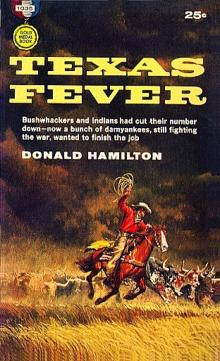 Texas Fever
Texas Fever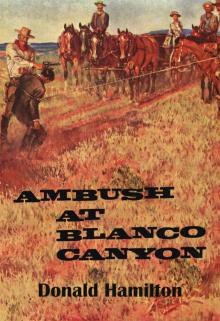 Ambush at Blanco Canyon
Ambush at Blanco Canyon The Big Country
The Big Country The Wrecking Crew
The Wrecking Crew The Devastators mh-9
The Devastators mh-9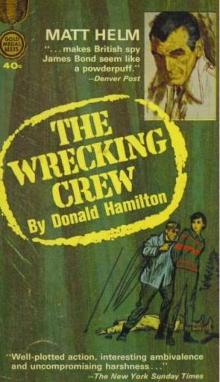 The Wrecking Crew mh-2
The Wrecking Crew mh-2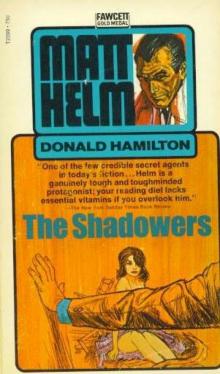 The Shadowers mh-7
The Shadowers mh-7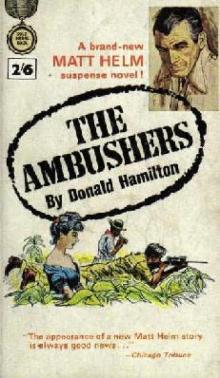 The Ambushers mh-6
The Ambushers mh-6 The Betrayers
The Betrayers The Terrorizers
The Terrorizers The Poisoners
The Poisoners The Devastators
The Devastators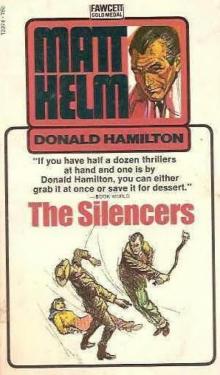 The Silencers mh-5
The Silencers mh-5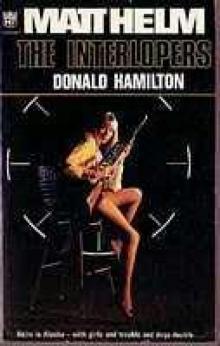 The Interlopers mh-12
The Interlopers mh-12 The Shadowers
The Shadowers The Annihilators
The Annihilators The Vanishers
The Vanishers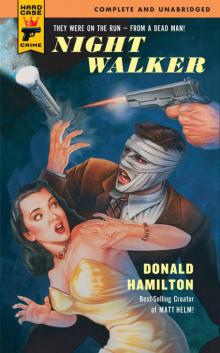 Night Walker
Night Walker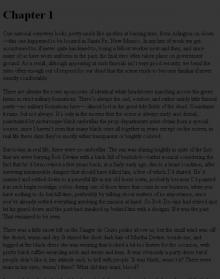 The Revengers
The Revengers The Frighteners
The Frighteners The Infiltrators
The Infiltrators The Intriguers mh-14
The Intriguers mh-14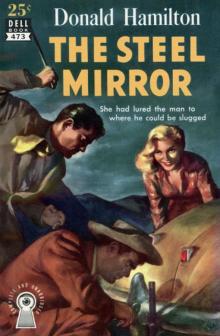 The Steel Mirror
The Steel Mirror The Menacers
The Menacers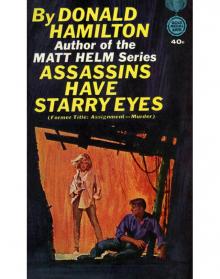 Assassins Have Starry Eyes
Assassins Have Starry Eyes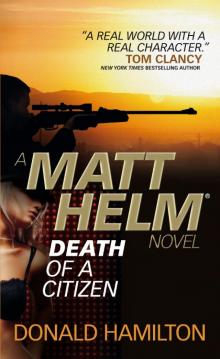 Death of a Citizen
Death of a Citizen Matt Helm--The Interlopers
Matt Helm--The Interlopers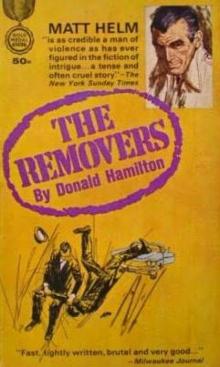 The Removers mh-3
The Removers mh-3 The Demolishers
The Demolishers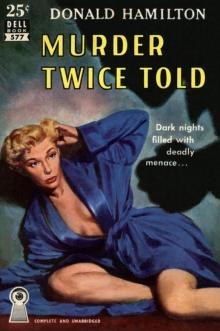 Murder Twice Told
Murder Twice Told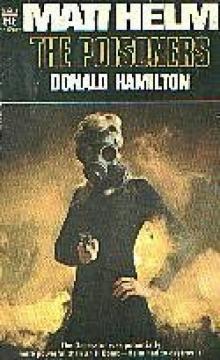 The Poisoners mh-13
The Poisoners mh-13 The Ambushers
The Ambushers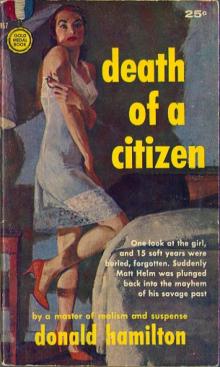 Death of a Citizen mh-1
Death of a Citizen mh-1 The Silencers
The Silencers The Removers
The Removers The Intimidators
The Intimidators The Damagers
The Damagers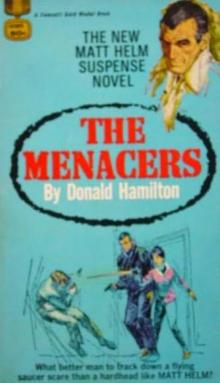 The Menacers mh-11
The Menacers mh-11 The Retaliators
The Retaliators Murderers' Row
Murderers' Row The Ravagers
The Ravagers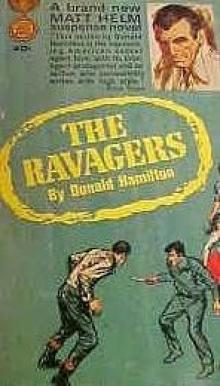 The Ravagers mh-8
The Ravagers mh-8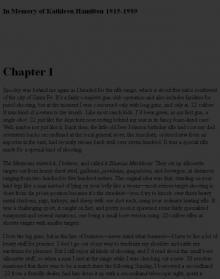 The Threateners
The Threateners The Betrayers mh-10
The Betrayers mh-10